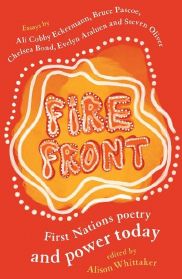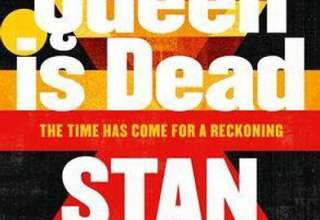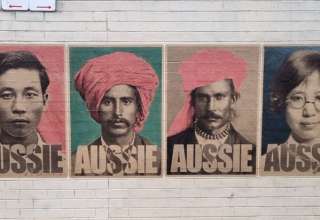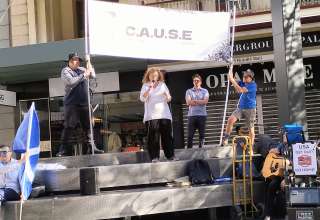Dropbear by Evelyn Araluen, winner Stella Prize 2022
& Fire Front: First Nations Power and Poetry Today ed. Alison Whittaker
by Wallace McKitrick
The Stella organisation is, in its own words, ‘a major voice for gender equality in Australian literature. Stella drives significant cultural change by elevating the work of Australian women writers – cis, trans, and non-binary inclusive. We promote greater access to, and participation in, the world of books and writing to combat gender bias in society.’
A major initiative of the organisation is the Stella Prize, an annual literary award celebrating Australian women’s writing. In this the tenth year of the Prize, Evelyn Araluen has won with her book Dropbear, published in 2021 by University of Queensland Press. Araluen, co-editor of Overland Literary Journal, is a descendant of the Bundjalung Nation.
Praise of Dropbear by the judges includes these lines:
‘… a breathtaking collection of poetry and short prose’; ‘Araluen’s brilliance sizzles when she goes on the attack against … Australia’s fantasy of its own racial and environmental innocence’; ‘… you’ll be taken on a wild ride. Like the namesake of its title, this collection is simultaneously comical and dangerous.’
Dropbear employs a range of styles. Many pieces elude categorisation as either poems, prose-poems or prose; but rather than that being a deficit, it is in this case a strength. The reader encounters forms and styles which were experimental in the 1950s-70s, even a style reminiscent of 1930s surrealism. In other pieces we find newly coined personal forms, such as in ‘Playing in the Pastoral’ which cleverly exposes euphemism and redaction in texts about Australian land and society; in ‘The Last Endeavour’, a modern myth written in a high register reminiscent of both ancient European legend and modern political fantasy genres; and in the ingenious ‘Appendix Australis’. Always Araluen turns form and style to the advantage of her message. And always present is the fascinating tension between, on one hand, rich (sometimes torrential) flows of imagery and multiple voices, and on the other hand, sharp analytical insight.
Throughout, the author engages in unerring deconstruction of monocultural settler nationalism. She has clear awareness of exploitative class arrangements in our society, and the convergence of racist, sexist and class-based streams of oppression. Mercilessly, Araluen dismantles false myths and tropes, including those from white ‘progressive’ sources. Threaded through all the work, expressed in many different tones – ruminative, fiery, grateful, ironic – is assertion of First Nations sovereignty as the foundation of political legitimacy and moral authority in this continent.
‘Unreckoning’ begins, ‘Sis, I have a ghost story’ and goes on to say, in its mid-section:
Under and over the silence and clunky chains of the colonising tongue, there is speaking in the rustle of leaf and call of bird. These are the words the land knows, for it made them in the cradles of country, in the salt and sand of sound. Songs carry through track and tract, lines are traced so the living know where to dance. I swear nothing of the immemorial slumbers, sis. This is the voice I use to call you, and the one you use to answer.
Although in some pieces Araluen is courageously personal or in subjective mood, it is never at the expense of her consciousness that she is a continuation of ancestors from whom she gathers her bearings in a fractured society.
It is hard to unlearn a language;
to unspeak the empire,
to teach my voice to rise and fall like landscape,
a topographic intonation
So in this place the shape of my place
I am trying to sing like hill and saltwater
And later in the same poem, ‘Learning Bundjalung on Tharawal’:
We are relearning this place through poetry;
I open my book and say, wayan,
here is a word which means road, but also root
and in it I am rooted, earthed,
singing between two lands
The reader quickly appreciates the delicacy of language in Dropbear, regardless of the mood or tone of a piece. Using language with joy and vitality, the author immerses us in the musical qualities of both Bundjalung and English. Woven in with this subtlety is a deep humanity.
Araluen’s is a young voice which will only increase in strength and powerful precision. She is already a key figure in the current wave of First Nations writers who, as worthy successors of earlier ‘greats’ such as Oodgeroo Noonuccal, Kevin Gilbert, Charmaine Papertalk Green and Alexis Wright, are taking the lead in Australian literature in general, redefining its purpose, content and moral compass.
Fire Front

We can see the importance of these younger writers in a longer timeframe when we turn to the anthology Fire Front: First Nations Poetry and Power Today, edited by Alison Whittaker (University of Queensland Press, 2020). This is a magnificent selection of great historical importance. It expresses stages of Aboriginal and Torres Strait Islander resistance, heroism and achievement over three generations from the 1950s to today.
Bruce Pascoe’s essay introducing one group of poems includes:
[O]ur people have always sung in verse … long before Europe chanced upon the idea of aesthetic language. … We are the wordsmiths of the world; we spoke seven to ten languages and used long and complex words in all of them to explain long and complex philosophical statements. We should not apologise for being good with words and their use – it is our heritage.More than 40 writers appear in Fire Front, old and young beside each other in each of the five sections. Some names are already well known nationally (for example, the ‘greats’ mentioned earlier, and Lisa Bellear, Ruby Langford Ginibi, Jack Davis, Archie Roach, Romaine Morton, Lionel Fogarty, Bruce Pascoe). Others are well known in their regions and perhaps more widely (for example, Kevin Buzzacott, Jeanine Leane, Jim Everett, Kirli Saunders, Diwurruwurru, Elizabeth Walker). And the younger poets include several with rising national profile (such as Briggs, Natalie Harkin, Ali Cobby Eckermann, Alison Whittaker). At the start of each section is a newly commissioned short essay by, respectively: Chelsea Bond, Evelyn Araluen, Bruce Pascoe, Steven Oliver and Ali Cobby Eckermann. Each displays virtuosity in this medium.
The anthology resembles a choral performance, with a large range of voices from city and bush combining in a unified song of survival, insight and shared aspiration. Some voices are declarative, some in soft register, some employing traditional languages of the land or Kriol, some in formal English, some in very modern vernacular. In sentiment and theme, their contributions reinforce each other. The reader is quickly absorbed in the collective vitality of the works.
This brief review ends with the opening paragraph of Ali Cobby Eckermann’s essay, ‘Medicine In, Obligation Out’, which introduces the fifth group of poems:
It is an honour to respond to this selection of poems. The challenge was how best to highlight the implication contained in each work, so superseded by style. There was little I could say; the poems stood on their own merit. I felt each poem reiterated the telling of stories, linked by the intergenerational experiences that often repeat without repair. I wanted to highlight how our history repeats. Every poem exists as part of that cycle. The poems show how the Western models of poetry and linear time are charades in Aboriginal poetry. For me, it was important to rejoice at how the weaving of language is resurgent. I felt excited as during this process the poets’ names created their own signature poem of lives, experiences and families.
Dear reader, you too can read Dropbear and Fire Front, and rejoice!








